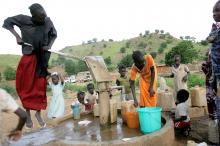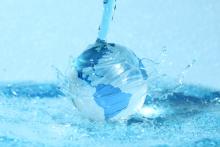Water
THE ANACOSTIA RIVER is a river of contrasts. Often called “the nation’s forgotten river,” it flows for eight-and-a-half miles through some of the richest and poorest communities in and around D.C., through residential and industrial zones, through marshes and military installations. In fact, the federal government owns so much land in the watershed that when all those federal toilets flush during a heavy rain, they drain directly into the river.
The Anacostia River watershed is home to more than 800,000 people, 43 species of fish, and nearly 200 species of birds—including our nation’s symbol, the bald eagle, and the majestic great blue heron. Yet the trash in the river is so deep and wide at times that you’re just as likely to see a heron walking across a flotilla of trash rather than flying over the water.
As the Anacostia Riverkeeper—part of the Waterkeeper Alliance movement to protect local waterways—it was my job for three years to be the eyes, ears, and voice of its watershed. Of the nearly 200 waterkeepers worldwide, I was the only riverkeeper who was also a minister. I was called “Rev. Riverkeeper.”
The antiquated sewer system that pumps more than 2 billion gallons of raw sewage, mixed with polluted runoff, into the river each year is not just a shame, it’s a sin. African-American churches along the Anacostia used to baptize their members in the river. Nowadays, the river wouldn’t wash away anyone’s sins. My goal as Rev. Riverkeeper was an Anacostia that was not only “fishable” and “swimmable”—as required by the Clean Water Act—but also “baptizable.”

Corporate raider T. Boone Pickens made billions as a Texas oil baron, but he’s betting that the real money will come from mining “blue gold”—water. Pickens owns more water than anyone in the U.S.—he’s already bought up the rights to drain 65 billion gallons a year from the Ogallala Aquifer, which holds the groundwater for much of the Great Plains. Almost all the Ogallala water—95 percent—is used for agriculture, but Pickens plans to pipe it down to Dallas, cashing in on the hotter-and-drier weather from climate change. (The result, according to an Agriculture Department spokesperson: “The Ogallala supply is going to run out and the Plains will become uneconomical to farm.”)
Pickens isn’t alone in his new role as a water baron. Multinationals such as Nestlé are buying up water rights, siphoning lakes, and selling our most precious resource to the highest bidder. Slick advertising has seduced many Americans into the mistaken belief that (expensive) bottled water is “purer” or “healthier” than tap water—and led to the annual consumption of 9.67 billion gallons of bottled water, with underserved Latinos and African Americans having the highest rates of bottled water use. And the Organization for Economic Cooperation and Development warns that by 2030 nearly half of the world’s population will inhabit areas with severe water stress.
As our authors explain, cities and towns across the country are in the midst of an epic fight to keep water as a public trust. Communities of faith have joined what they see as a battle for basic justice: Protecting the right of everyone, rich and poor alike, to the crucial stuff of life, water. —The Editors
THE UNITED STATES has one of the best public water supply systems in the world.
More than 250 million people count on local governments to provide safe drinking water. Over the last 40 years, federal, state, and municipal governments have worked together to improve and protect water resources. The Clean Water Act, the Safe Drinking Water Act, and the Endangered Species Act have kept the U.S. on target for preserving rivers, lakes, watersheds, wetlands, natural aquifers, and other sources of fresh water.
Great strides have been made in managing waste water and storm water. More than 90 percent of community water systems in 2012 met all federal health standards. Public water utilities have been a tremendously successful model for the U.S. and continue to keep drinking water safe, accessible, and affordable for all Americans.
It hasn’t always been this way.
During the 1800s, private companies controlled the water systems of several large U.S. cities—to dire effect. Because the companies were more interested in making a profit than providing good service, many poor residents lacked access to water. As a result, cholera outbreaks were common in poor neighborhoods; water pressure was sometimes too low to stop fires, which destroyed both homes and businesses.
By the turn of the 20th century, city governments, including Baltimore, Boston, New Orleans, and New York City, had taken over drinking water provision from private companies. The goal of government was to improve service, reduce waterborne diseases, and increase water pressure to better fight fires. New York City, for example, assumed control of its drinking water services from the bank and holding company called the Manhattan Company, the predecessor of JPMorgan Chase, after an outbreak of cholera killed 3,500 people and a devastating fire caused extensive property damage.

FROM THE RIVER to the rope. From the creek to the cross. From the dove and a "voice from above" to death by state execution and profound silence.
This is Lent. This is the Jesus Road, the Christian way. O Lord, how can we follow you?
Lent is time of remembering ourselves. In the ancient church, those preparing for baptism were publicly challenged: Do you renounce your bondage to Master Satan? Do you reject the slave-mind and all its glamour and subtle temptations? Will you allow Christ to buy your freedom?
The catechumen turned to face the east and the dawn, answering: "I give myself up to thee, O Christ, to be ruled by thy precepts."
It is Lent. We go down to the river to pray. We step into the waters of repentance. We surface as a new creature in Christ. From that moment onward, we imprint on Jesus. This is our survival strategy as newborn disciples. We follow him, like ducklings behind their mother.
After his baptism in the Jordan River, Jesus is driven straight out—into the unloved places, into the wilderness. There he is pricked by demons to toughen him up. He is being prepared. He must look into his own despair. Satan is the supreme surgeon for separating us from our hope.
IN A CROWDED auditorium [in Honduras after Hurricane Mitch] that served as a shelter for 900 people, the scarce supply of drinking water was kept in a bucket and labeled with a sign that said "Do not use your own cup." Five bored, mischievous children, however, could think of nothing better than to try to stick their cups in the water. Then one relief worker gave them a special assignment. "This water is very important," she said. "I need you to be the guardians of the water so that no one dips in their own glass." And they, feeling respected and needed, became the fierce, undaunted protectors of the water supply.
Similarly, countless Hondurans are saying, "If not us, then who?"—righting their relationship with themselves, assuming the task of rebuilding their homes and communities, recognizing that progress occurs when they participate. Women, who have never even valued their never-ending activity as work, are speaking up when the pay sheets are evaluated. "I planted a garden. I rebuilt the wall of my house. I earned my corn and beans."

On my desk, next to my laptop, is a can of seltzer water. My grapefruit-flavored, bubbly water sits about four inches away from my left hand as I write. When the can is empty, I might take another from the fridge or fill up a water bottle at the kitchen sink.
Water drives my day, but I rarely think about it. I cook pasta in it. I heat water to make tea. I fill a bucket to mop the floor and a draw a bath with hot water and soak in it. At the moment, my dishwasher is growling away, and I’m waiting to hear the pleasant beep that alerts me that the clothes in the washer downstairs are clean.
I’ve never considered water a women’s issue. Not until this past week, that is. On Friday, the day before World AIDS Day 2012, I had the privilege of attending World Vision’s Strong Women, Strong World luncheon in New York City. Strong Women, Strong World is a new initiative “supporting sustainable change in some of the difficult places in the world to be a girl or a woman.” The focus of the day was water.
The Honorable Melanne Verveer, U.S. Ambassador at-large for Global Women’s Issues, spoke at the event. She celebrated the progress humanitarian organizations such as World Vision have made in the effort to eradicate HIV/AIDS, but reminded us that the number of people living with HIV is at an all-time high. In 2010, HIV/AIDS killed 1.8 million people. Sixty percent of those living with HIV are girls and women, and AIDS is the leading cause of death of women of reproductive age (15-44 years old) globally.
“HIV,” Ambassador Verveer said, “has the face of a woman.”
1) Tune in. Log off. Let go.
Darting fireflies supplied most of the light that pierced the rural darkness when I arrived at the Wild Goose Festival site on a farm in Shakori Hills, N.C., late last Wednesday night. I left my ballast — a huge duffel bag containing a pup tent and enough bug spray to cover a small village, a suitcase full of mostly tie-dyed clothing, a large computer case and a camera bag — in the 15-person van that had spirited me from the Raleigh-Durham airport to the farm about an hour away.
While I’m not exactly known for packing light when I travel, my unusually cumbersome luggage for the festival contained the various gadgets and gizmos that would allow me to work from my campsite on the farm — live blogging about the festival, complete with video, audio and photos, and the help of four Sojourners interns who were set to arrive Thursday afternoon.
I had barely stepped foot on the campground when I checked my smart phone to see if cell service and the festival’s WiFi were working. They were. Good, I thought. All set to work. It would be a hectic few days covering the festival’s numerous speakers and musical performances, but we’d get it done.
Ah, hubris. Humans make plans. God chuckles and says, “Oh, really?”
The Almighty, it would seem, had better ideas for how I should spend my time at Wild Goose, which takes its name from the Celtic metaphor for the Holy Spirit.
The Atlantic reports on 'The Coming Global Water Crisis':
"In the next twenty years, global demand for fresh water will vastly outstrip reliable supply in many parts of the world. Thanks to population growth and agricultural intensification, humanity is drawing more heavily than ever on shared river basins and underground aquifers. Meanwhile, global warming is projected to exacerbate shortages in already water-stressed regions, even as it accelerates the rapid melting of glaciers and snow cover upon which a billion people depend for their ultimate source of water."
Read more about the crisis here

How much water have you used today?
You probably took a shower, used your toilet, brushed your teeth, maybe boiled some for a cup of tea of coffee, not to mention being well on the way to the 64 ounces of water that we’re told to drink every day.
Very quickly the amount of water you’ve used, without even thinking, adds up. Thankfully, water is not a luxury in America, or the developed world in general.
But a new video released by the United Nations Refugee Agency (UNHCR) today paints a stark picture of just how precious and luxurious resource water is in many parts of the world.
A new poem by Sarah Vanderveen...
I pulled on my wetsuit
quick, quick
pausing to take note
of a new hole under the left arm, darnit
and paddled out.

Climate change affects the poorest the hardest. Most things do. In the parts of the world where climate change is most prevalent, it is those who have done the least to cause it that are bearing the brunt of its effects.
It is the Malawian farmer whose crops have failed because the seasonal rains didn’t start at the usual time. It’s a Bangladeshi who can see the sea-levels rising around her town year after year, and has nowhere to go. It’s even an American family whose food bill grows ever larger because of the stresses that a changing climate is having on food security worldwide.
These are neither the people nor the organizations that have spent decades turning a blind eye to their responsibility as good stewards of our environment. They are not the people who, in the face of more and more extreme weather patterns, turn an issue of human survival into an ideological war.
It is for them that we must adapt.

From Judgment To Hope (OPINION); Obama Administration To Consider Gay Rights When Allocating Foreign Aid: Source; Coming Soon To The Southwest: The Age Of Thirst; Iowa Republicans Side With Newt Gingrich Over Mitt Romney On Immigration; Occupy Wall Street Protesters To Occupy Foreclosed Homes The Amazing Rise Of Anna Hazare, India's Gandhi-Like Protest Leader; Arnold Schwarzenegger Urges Candidates To Champion Green Energy; The Bomb Buried In Obamacare Explodes Today-Hallelujah!
According to an article at GreenBiz.com, the company Unilever's push toward sustainability encountered a major obstacle in changing people's habits: the amount of time folks took to take a shower. Many of us not only shower too frequently (there is evidence that suggests that daily showers are not always good for us), but many of us also spend far too long in the shower.
My iPhone died and I didn't even care. A cooler full of water and ice was dumped on my head, which soaked not only me, but also my phone. My older son Luke's Little League team, called the Nationals, had just won the Majors championship in Northwest Little League.
